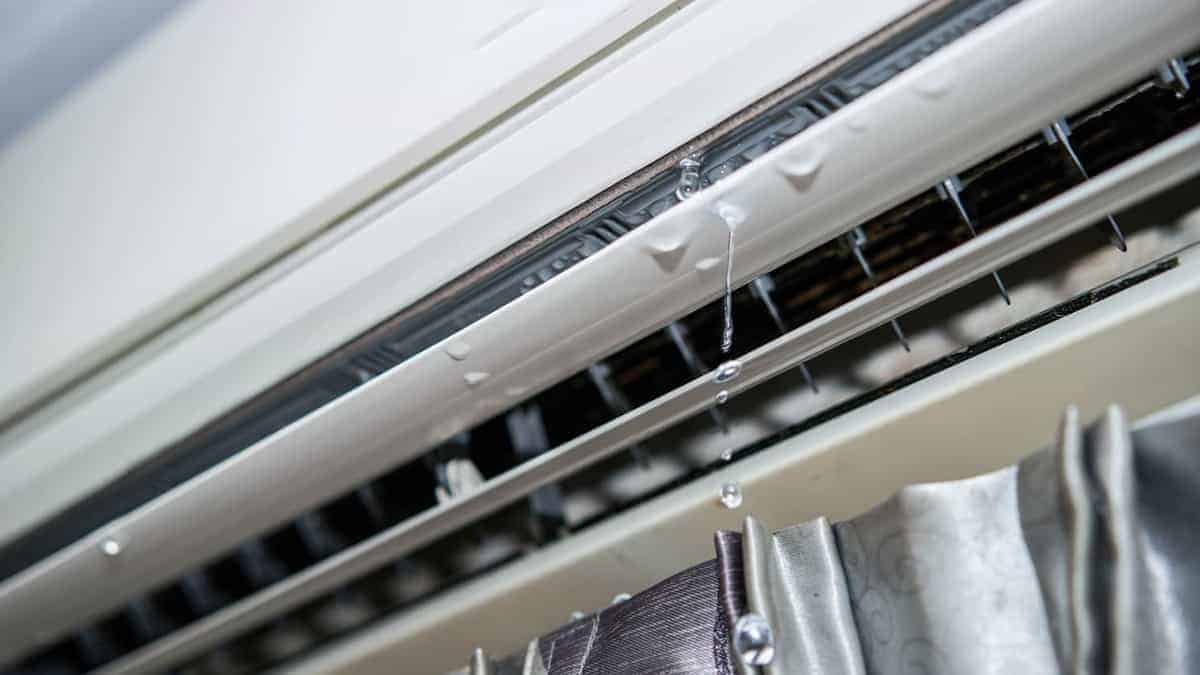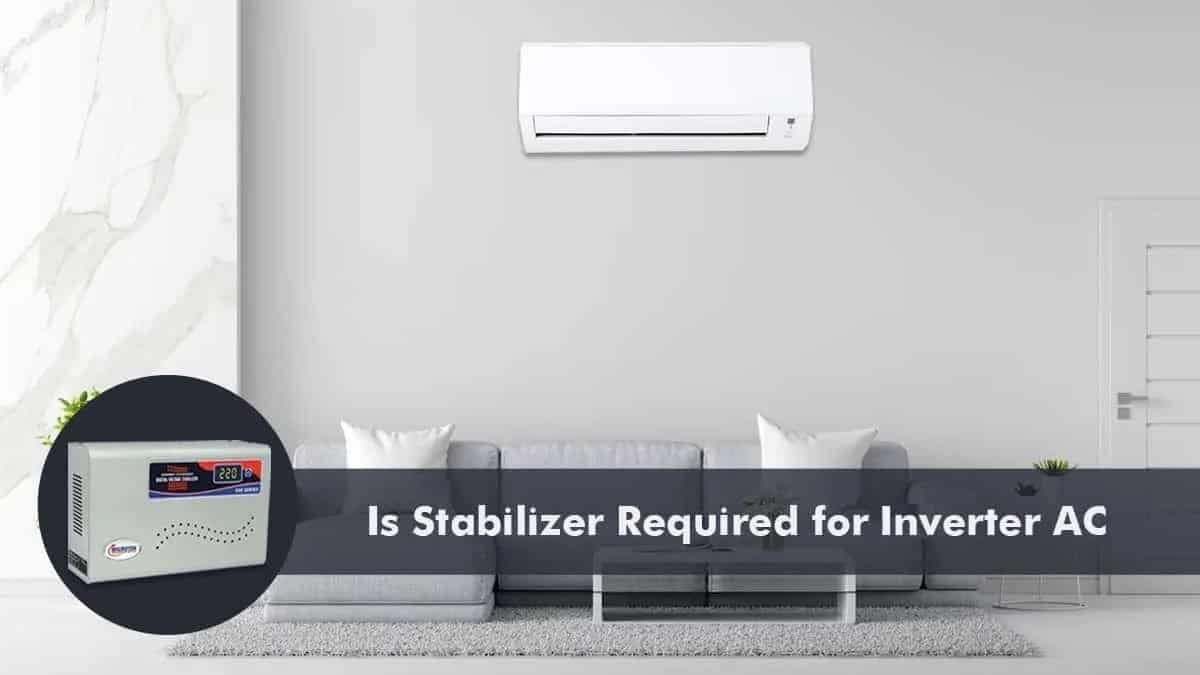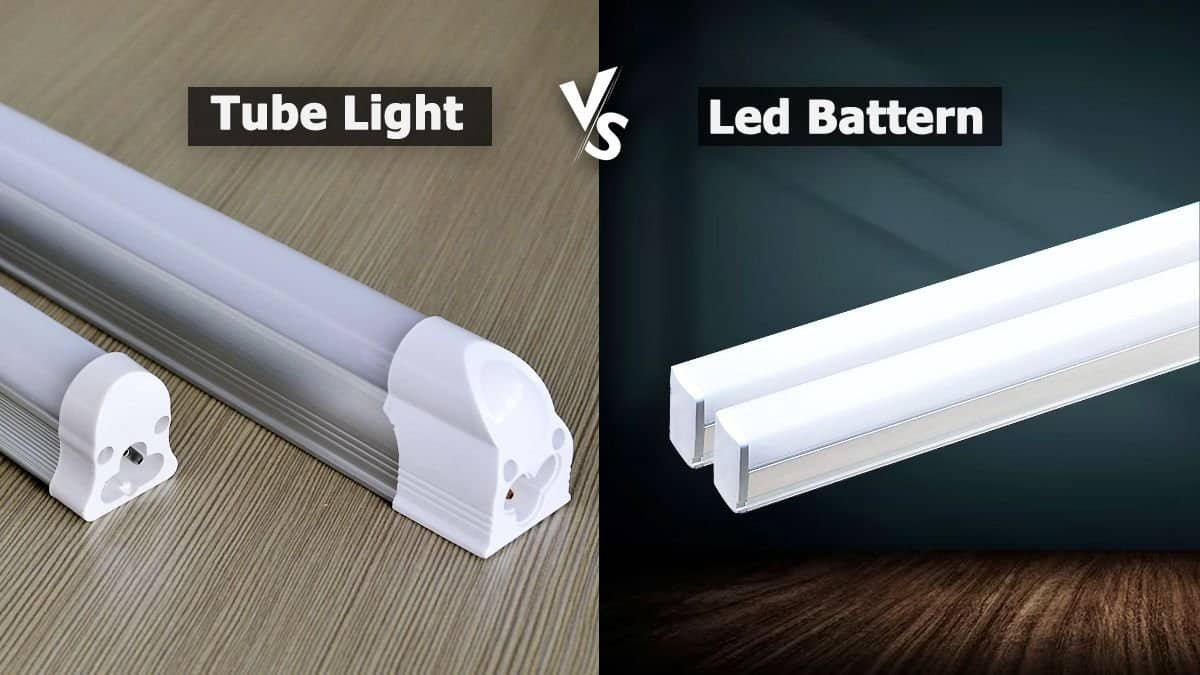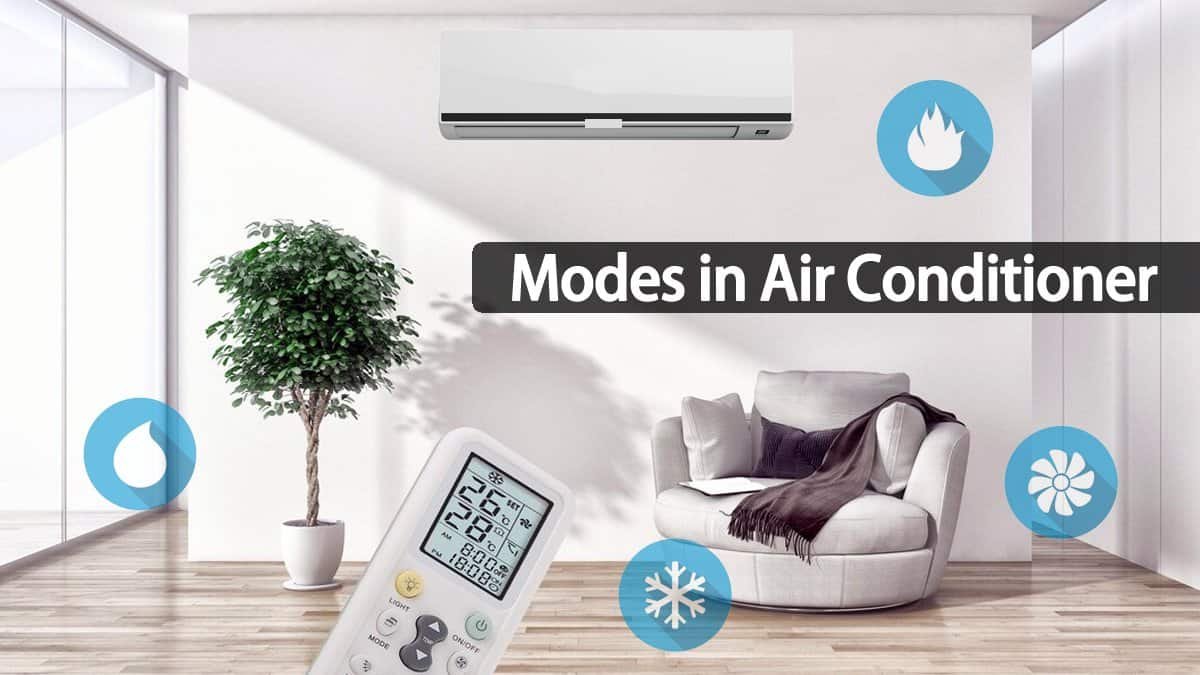When the temperatures start to soar and humidity rises in India, air conditioners provide a much-needed respite from the heat. However, if you notice water dripping or pooling around your AC unit, take it as an indication that something may be wrong. Though AC units are designed to produce condensation, they should not leak into your home. Standing water can damage your floors and walls, creating potential mould problems or other health hazards. Thankfully, many such leaks can be easily addressed with a few do-it-yourself steps.
In this post, we’ll explore the various causes of air conditioner leaking water in India and provide our readers with tips and techniques for fixing these problems and preventative measures for avoiding future incidents. We look forward to providing this information and helping you fix water leaks in your air conditioner. Let’s get started!
Table of Contents
Understanding the Basics: How Does Your AC Work and Why Does It Produce Water?

Before we delve into the specifics of fixing water leaks from your air conditioner, it’s important to understand how your AC works and why it produces water in the first place.
Air conditioners are designed to remove heat and moisture from the air inside your home, creating a cool and comfortable living environment. They do this by circulating refrigerant through a closed-loop system that absorbs heat inside your home and releases it outside.
As the refrigerant absorbs heat from the air, it also causes moisture to condense on the evaporator coil, which is located inside your home. This water drips into a collection pan or drain and is removed from the unit through a drain line or pump.
So, why does your air conditioner produce water in India? The answer lies in the humidity levels inside your home. When humidity is high, your AC has to work harder to remove moisture from the air, which results in more condensation and potentially more water leakage.
Identifying the Problem: Signs that Your Air Conditioner is Leaking Water

Now you have the basics of how your AC works and why it produces water, let’s move on to identifying the signs of a water leak in your air conditioner.
If your air conditioner is leaking water, it’s a sign that something is preventing the normal cooling cycle. You can watch for several characters to determine if your AC leaks water.
One of the most obvious signs is the presence of a puddle around your AC unit, which can be found in your basement or closet. You may also notice a musty smell, which is an indication of mould growth.
In some cases, a leaking attic unit can cause water to flood your ceiling and drip down your walls, causing significant damage to your home. To prevent this, it’s a good idea to have an HVAC professional install additional safety switches on the drain line, such as a pan switch or an E-Z trap. These safety features can help to shut off your AC unit if it starts to leak water, preventing water damage to your home.
Now that you know how to prevent water damage, let’s look at some common causes of air conditioner leaking water in the next section.
1. Fixing a Damaged Drain Pan: Steps to Repair or Replace a Faulty Pan
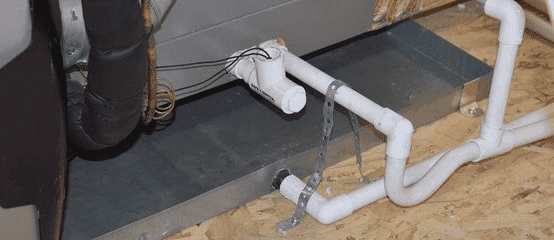
The drain pan in your AC system catches the condensation on the coils as it drips off. Depending on the type and location of your AC unit, your drain pan setup may vary, but the purpose remains the same. All systems have a primary drain pan located directly underneath the evaporator coil. Horizontal systems also require a secondary drain pan to catch excess water that may escape the primary pan.
Most drain pans are made from galvanized steel, stainless steel, or polymer. While galvanized steel is the most widely used and least expensive option, it is also the least durable and typically lasts around 20 years. Stainless steel drain pans are more corrosion-resistant and last a little longer (about 25 years) but are more expensive. Polymer drain pans are the most durable and cost-effective option, as they don’t rust and are resistant to microbial growth.
If your steel or polymer drain pan is compromised by rust or damage, the water will leak where it’s not supposed to. In this case, attempting to seal the pan yourself is not a long-term solution. The seal will eventually break, and you’ll face the same problem again.
To fix a damaged drain pan, the best action is to call a professional HVAC technician. They can assess the damage and determine whether the pan needs replacing or replacing. If a replacement is necessary, they can also help you choose the best type of pan for your specific AC unit and install it properly to prevent further water leaks.
2. Clearing a Clogged Drain Line: Tips for Removing Blockages and Preventing Future Clogs
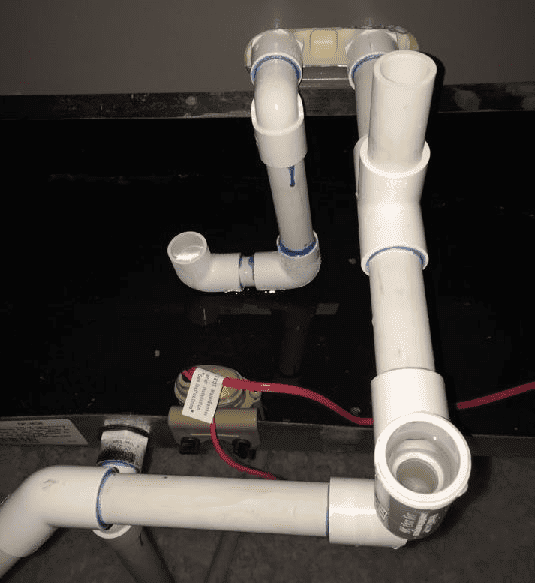
The drain line carries the condensate (water) from your air conditioner outside via the drain pan. Over time, dirt, debris even mould can accumulate in your air conditioning system, particularly in the condensate drain line, if you have poor quality, old, or damaged AC air filters. This accumulation, coupled with algae growth in the wet and dark areas of the drain pan and line, can cause the line to clog, leading to flooding of the drain pan.
The weight of the water buildup in the drain line can also strain the connection to the drain pan, causing the line to loosen or even disconnect entirely, resulting in water leakage from your AC unit. Removing blockages in the drain line and avoiding future clogs is crucial to prevent these issues.
Here are some tips for clearing a clogged drain line and preventing future clogs:
- Turn off your Air Conditioner: Before clearing the drain line, turn off your AC unit to prevent further flooding or damage.
- Locate the Drain Line: The drain line is typically near your home’s outdoor AC unit or the air handler.
- Clear the Blockage: Use a wet/dry vacuum or a pipe cleaner to remove any dirt, debris, or algae buildup in the drain line. Alternatively, you can pour a mixture of white vinegar and water down the drain line to dissolve the blockage.
- Clean the Drain Pan: Once the blockage is removed, use soap and water to remove any remaining dirt and debris.
- Prevent Future Clogs: To prevent future clogs, replace your AC air filters regularly, ideally every 1-3 months. You can also install a condensate drain pan treatment to prevent algae growth in the drain pan and line.
These tips can clear a clogged drain line and prevent future clogs, helping your AC unit run smoothly and efficiently.
3. Addressing a Failed Condensate Pump: Replacing or Repairing the Pump to Stop Water

Condensate pumps are necessary when gravity alone cannot carry water from the drain pan outside. For instance, your air conditioner may be in a basement or an attic with an elongated condensate line. A centrifugal pump is required to push the water along in these situations. The pump is triggered when the condensate from the evaporator coil reaches a specific level in the pump’s tank, activating the float switch.
However, like any other component in your AC system, the condensate pump can malfunction and fail, leading to water leaks from your AC unit. If the pump’s tank or tubing cracks due to prolonged use, the water will escape and pool around your AC unit, potentially causing significant damage.
To address a failed condensate pump and prevent water leaks, you may need to either replace or repair the pump. Here are some steps you can take:
- Turn off your Air Conditioner: Before attempting to replace or repair the condensate pump, turn off your AC unit to avoid any electrical hazards or water damage.
- Inspect the Pump: Check for visible signs of damage or wear and tear, such as cracks, leaks, or broken parts.
- Determine Whether to Repair or Replace the Pump: If the pump has minor issues, such as a clogged or stuck float switch, you may be able to fix it. However, if the pump is damaged or has stopped working, you’ll likely need to replace it.
- Install the New Pump: If you decide to replace the pump, follow the manufacturer’s instructions carefully to ensure proper installation.
- Test the New Pump: Once the new pump is installed, test it to ensure it’s working correctly and preventing water leaks.
By addressing a failed condensate pump and repairing or replacing it, you can prevent water leaks and avoid costly damage to your AC unit.
4. Leaks Caused by Frozen Coil: Steps to Defrost and Prevent Coil Freezing in the Future

Evaporator coil freezing can be caused by reduced airflow and a refrigerant leak. Airflow can be restricted by several AC issues, including a dirty filter, blocked return vent, damaged fan, collapsed air duct, or a dirty coil. If there is no warm air to be absorbed by the refrigerant in the coil, it won’t turn into a gas and will freeze. On the other hand, when refrigerant leaks, the remaining liquid in the coil expands, which lowers its temperature and causes it to freeze.
When the coil freezes, the drain pan can capture standard quantities of dripping water from the air conditioner. However, if you shut off the AC as you should when the coil is frozen, the melting block of ice will overwhelm the drain pan and line, and water will start leaking out.
To defrost a frozen coil and prevent future coil freezing, take the following steps:
- Turn off your AC: When you notice a frozen coil, turn off your AC to prevent water damage or electrical hazards.
- Check for Reduced Airflow and Refrigerant Leaks: Inspect your AC for issues that could cause reduced airflow or refrigerant leaks, such as dirty filters, blocked return vents, damaged fans, collapsed air ducts, or low refrigerant levels.
- Defrost the Coil: To defrost it, turn on your fan and let it run for several hours until the ice melts completely.
- Clean or Replace Filters: If your filters are dirty, clean or return them to ensure proper airflow.
- Check and Repair Ducts: Inspect your air ducts for any damages or collapses that could restrict airflow, and repair them as necessary.
- Call a Professional: If you suspect a refrigerant leak, contact a professional HVAC technician to diagnose and fix the problem.
By taking these steps, you can defrost a frozen coil and prevent future coil freezing, reducing the risk of water leaks and other AC issues.
Also Read
- How Do Window AC Vs Split AC Differ In Power Consumption?
- Best Place to Install Air Conditioner in Bedroom
- Know the Difference Between 3 Star and 5 Star AC
Handling Water Leaks Inside: What to Do if Your AC is Leaking Water Inside the Unit?

When you notice water leaking inside your AC unit, taking immediate action is important to prevent further damage.
First, turn off your air conditioner to stop the water flow. After that, you’ll need to clean up the leaked water, which may require a shop vac.
If a frozen coil causes the leak, there are a few quick fixes you can try:
- Defrost your evaporator coil by turning on the fan while the AC is still off. It will help to speed up the thawing process.
- Check your air filters and replace them if they are dirty or clogged.
- Check your air vents for any obstructions that may be blocking airflow.
Don’t delay addressing water leaks inside your AC unit, as they can lead to serious damage and costly repairs if left unchecked. If these steps don’t solve the problem, the issue is likely with your drain pan, drain line, or condensate pump. In this case, it’s best to call an HVAC professional to diagnose and repair the problem.
Preventing Future Leaks: Tips and Maintenance Techniques for Keeping Your AC Running Smoothly
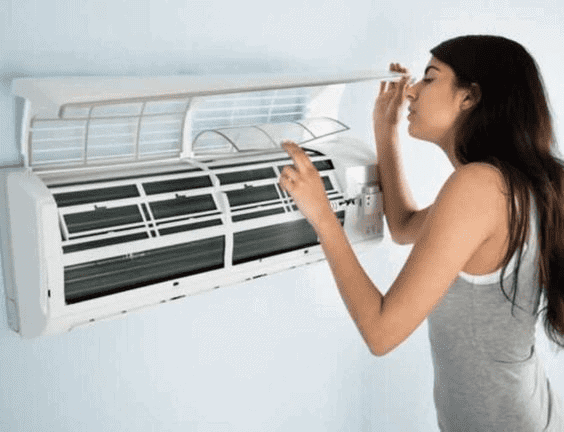
To prevent future water leaks and keep your AC running smoothly, it’s important to perform regular maintenance and take proactive measures to avoid common issues. Here are a few easy tips and tricks to help you prevent future leaks:
- Replace Air Filters Regularly: Dirty or clogged air filters can restrict airflow and cause your evaporator coil to freeze, leading to leaks. Replace your air filters every 1-3 months, depending on usage.
- Keep your Outdoor Unit Clean: The outdoor unit of your AC can become clogged with dirt, leaves, and debris, which can restrict airflow and cause your system to malfunction. Clean the unit regularly and trim back any vegetation that may be growing around it.
- Schedule Regular Maintenance: Have your AC serviced by a professional HVAC technician at least once a year to check for potential issues and perform necessary maintenance tasks.
- Inspect and Clean the Condensate Drain Line: Algae and other debris can accumulate in the condensate drain line, causing clogs and leaks. Inspect and clean the line regularly to prevent this from happening.
- Check for Proper Drainage: Ensure that your AC’s drain pan and line are functioning properly and draining water away from your home. Call a professional for repair if you notice any leaks or standing water.
Conclusion

In conclusion, it is important to diagnose the issue behind water leaks from your air conditioning unit and take the proper steps to address it. Common causes of such leaks can include clogged drain lines, failed condensate pumps, or frozen coils. By being aware and following these tips and techniques, you can minimize the risk of future water leakage issues with your AC system and ensure it runs properly. For any further inquiries or questions, please don’t hesitate to contact us for assistance. Otherwise, feel free to leave your questions in the comments section, and we’ll respond as soon as possible.
FAQs
Why is my air conditioner leaking water?
Air conditioners produce condensation as they operate, typically draining away from the unit through a drain line. If the drain line becomes clogged or damaged, the water may back up and leak from the air conditioner. Other possible causes of water leaks include a dirty air filter, low refrigerant levels, or a damaged condenser coil. Refer to the above post for a detailed explanation.
How can I prevent water leaks from my air conditioner?
Regular maintenance is the key to preventing water leaks from your air conditioner. This includes changing the air filter regularly, cleaning the condenser coil, and having the unit inspected by a professional at least once yearly. You should also ensure the drain line is properly connected to the team and free from obstructions. Refer to the above post for a detailed explanation.
Can I fix a water leak in my air conditioner myself?
While homeowners can fix some minor water leaks, having a professional handle air conditioner repairs is generally recommended. Attempting to fix the problem yourself could lead to further damage to the unit or even injury if you’re unfamiliar with electrical systems. Refer to the above post for a detailed explanation.
How much does fixing a water leak from an air conditioner cost?
The cost of fixing a water leak from an air conditioner will depend on the cause of the leak and the extent of the damage. Simple repairs, such as unclogging the drain line, may cost only a few hundred dollars. In contrast, more extensive repairs, such as replacing a damaged condenser coil, could cost several thousand dollars. It’s best to have a professional inspect the unit and estimate the repair cost.
